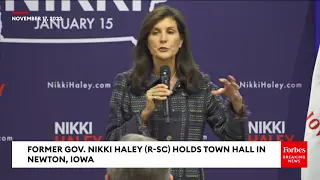In a recent turn of events, tech mogul Elon Musk has voiced strong opposition to former South Carolina Governor Nikki Haley’s proposal to eliminate anonymous social media accounts. Musk, known for his influential role in the tech industry, decried the idea as “super messed up,” highlighting a clash of views on digital privacy and freedom of expression.

Haley’s Proposal: Ending Anonymity to Curb Online Misconduct
Nikki Haley, a prominent figure in the Republican Party, recently suggested a bold initiative to address the challenges posed by online misconduct. In her proposal, she advocates for the eradication of anonymous social media accounts, arguing that this move would hold individuals accountable for their online actions and reduce the prevalence of misinformation.
Super messed up. She can stop pretending to run for president now.
— Elon Musk (@elonmusk) November 15, 2023
Musk’s Critique: A Defense of Digital Anonymity
Elon Musk, the CEO of Tesla and SpaceX, took to social media to express his disagreement with Haley’s proposition. Musk’s response underscores a fundamental disagreement on the balance between privacy and accountability in the digital realm. He described the proposal as “super messed up” and suggested that anonymity on social media serves as a crucial tool for free expression.
The Nuances of Online Privacy: Musk’s Perspective
Musk’s stance appears to be rooted in a broader philosophy that values the protection of individual privacy in the digital age. He contends that while curbing online misconduct is essential, eliminating anonymity is not the solution. Musk argues that people have a right to express their views without fear of retribution, emphasizing that anonymity can empower individuals to voice dissenting opinions without facing potential consequences.
The Dilemma of Misinformation: Haley’s Perspective
Nikki Haley’s proposal, on the other hand, reflects a growing concern about the rampant spread of misinformation and abusive behavior on social media platforms. The anonymity afforded by these platforms, she argues, enables users to engage in harmful activities without being held accountable. By dismantling the shield of anonymity, Haley aims to create a more responsible digital environment.
You know who were anonymous writers back in the day? Alexander Hamilton, John Jay, and James Madison when they wrote the Federalist Papers.
They were not "national security threats," nor are the many conservative Americans across the country who exercise their Constitutional… https://t.co/YkAGMhUVCX
— Ron DeSantis (@RonDeSantis) November 15, 2023
Public Opinion: Divided Views on the Matter
The clash between Musk and Haley brings attention to the ongoing debate about the role of anonymity in online discourse. Public opinion on the matter is divided, with some supporting the idea of increased accountability and others emphasizing the importance of preserving digital privacy rights.
The Challenge for Policymakers: Balancing Act in the Digital Age
As the debate over online anonymity intensifies, policymakers face the daunting task of striking a balance between preventing online misconduct and safeguarding individual privacy. The challenge lies in crafting regulations that address the root causes of digital toxicity without infringing on fundamental rights.
Conclusion: A Complex Landscape of Digital Governance
The clash between Elon Musk and Nikki Haley exposes the complexities of navigating the digital landscape. While both perspectives carry valid concerns, finding common ground that preserves individual freedoms while combating online misconduct remains a formidable task. As discussions around digital governance evolve, it is clear that the intersection of technology, privacy, and accountability will continue to shape the future of online discourse.











Discussion about this post